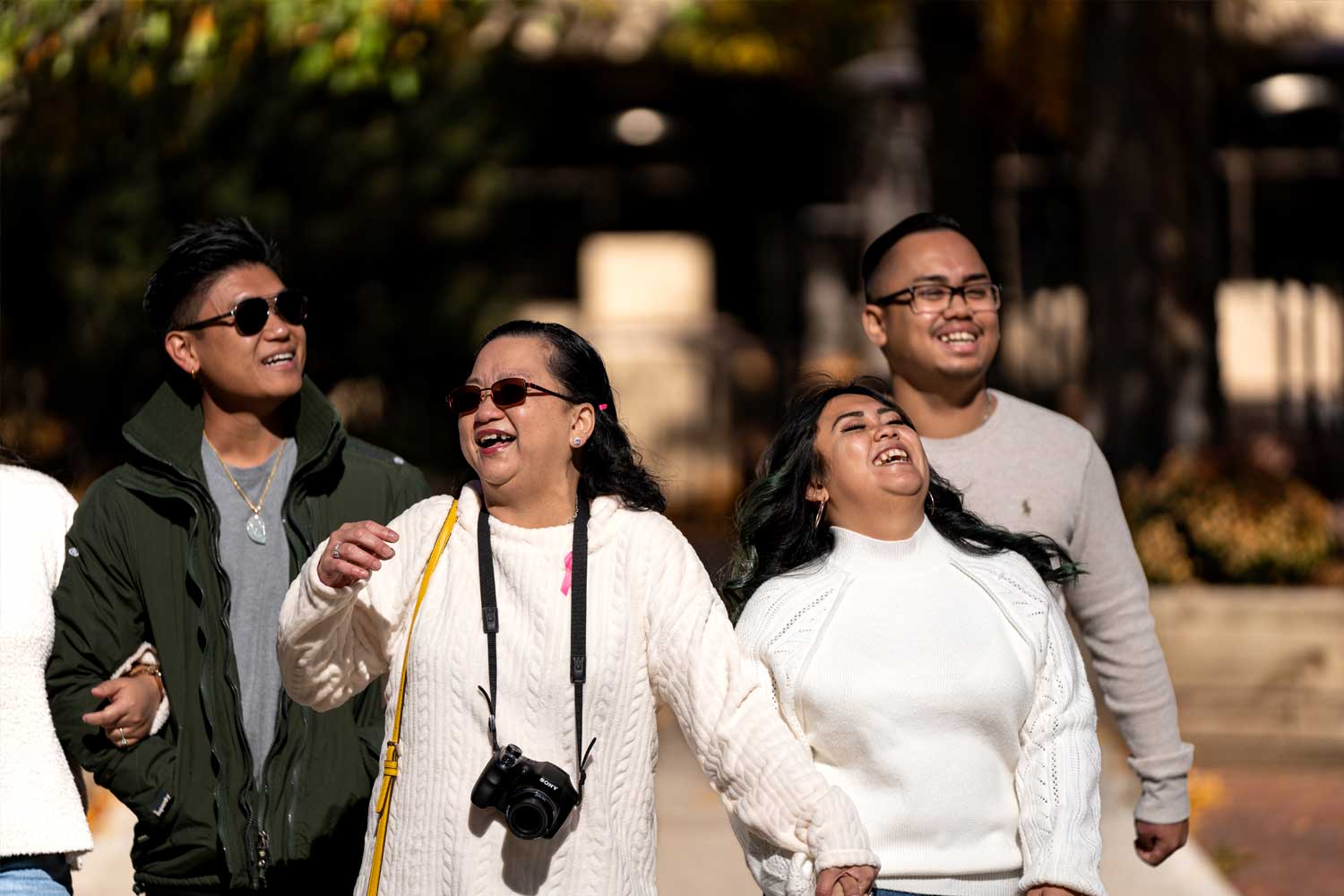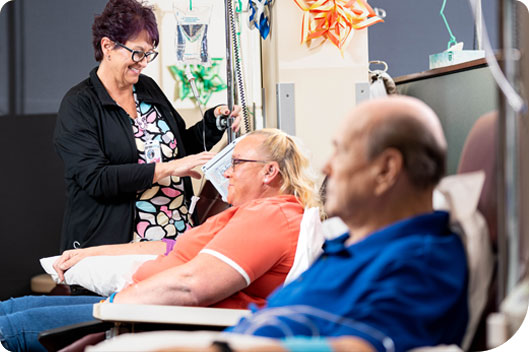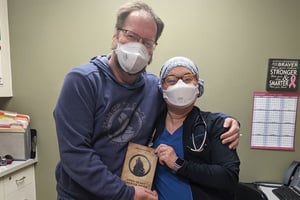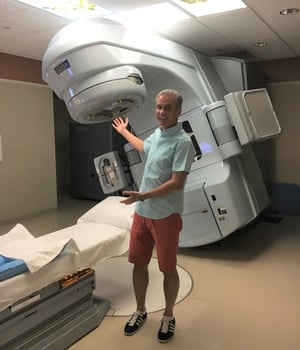Colorectal Cancer Care
A lot has changed in colorectal cancer care over the past decade, but rest assured that the team at Rocky Mountain Cancer Centers is up to date on the latest colon and rectal cancer treatment options available. If you or a loved one has been diagnosed with colorectal cancer, you can access coordinated, comprehensive care at one of our 19 convenient locations throughout Colorado.


By Your Side Throughout the Colorectal Cancer Care Journey
At RMCC, you get more than a colon and rectal cancer doctor – you get an entire team of specialists who are relentlessly dedicated to your health. We treat the whole patient, addressing your physical, emotional, social, practical, and spiritual needs in a compassionate, community-based setting.
Understanding a Colorectal Cancer Diagnosis
Most colorectal cancer is found during routine screenings. There have been changes in the routine screening process that make it easier to stay on schedule. Find out what tests are used to detect colorectal cancer.
Helpful Information for Newly Diagnosed Colorectal Cancer Patients
If you've received a colorectal cancer diagnosis, it's likely you have a lot of questions about what you will face in the coming days, weeks, and months. Our goal is to help you prepare both mentally and physically for your first appointment with your colorectal cancer specialist.
Specializing in Colorectal Cancer Care
Our Team Is Ready to Help You and Your Family
As a patient of Rocky Mountain Cancer Centers, you will have access to our colorectal cancer specialists at any of our locations across Colorado, including Boulder, Colorado Springs, and Denver. Our team is experienced in the various aspects of colorectal cancer care and treatment including clinical research trials. Our patients have access to more clinical trials than any other cancer facility in Colorado.

Find a Colorectal Cancer Specialist Near You
The comprehensive approach offered by our colorectal care team combines the most advanced treatments with education, support services, and complementary therapies.
Understanding Colorectal Cancer
Colorectal Cancer Quiz
Test Your Knowledge About Colorectal Cancer
Colorectal Cancer Treatments Available Through RMCC
Colorectal cancer treatment is not one-size-fits-all. Your doctors will work with you to create a personalized treatment plan which may include surgery, chemotherapy, targeted therapy, or radiation therapy.
Latest Colorectal Cancer Treatments
Your oncologist and the team at RMCC will work together to determine which treatments are most likely to work best for you based on your specific type of cancer and other factors.
Colorectal Cancer Surgery
Surgery is often part of the treatment process. The timing and type of surgery vary based on the location and stage of cancer and will be decided together with your oncologist.
Clinical Trials for Colorectal Cancer
RMCC oncologists actively participate in clinical trials that provide our patients access to promising new therapies. Not every patient qualifies. See if a trial is right for you.
Colorectal Treatment Side Effects
Most patients with colorectal cancer experience some side effects from treatments. These can vary from patient to patient. Learn more about what you might expect.

Colorectal Cancer Education Center
Want to learn more about colorectal cancer? Our colorectal cancer education center includes articles, videos, and patient stories.

Colorectal Cancer FAQs
Helpful Tips and Information About Colorectal Cancer From Our Blog

What Are the Differences Between Colon Cancer and Rectal Cancer Treatment?
Colorectal cancer is often talked about as a single type of cancer encompassing both colon and rectal cancers. While they do share many similarities,...

High-grade Colon Dysplasia: Is it Cancer?
You may be feeling a bit concerned if you heard the words "colon dysplasia" following a recent colonoscopy, but try not to be alarmed. In simple...

How to Prepare for Colorectal Cancer Treatment Side Effects
While there are several different treatments for colorectal cancer, a common approach is chemotherapy after surgery. For most colorectal cancer...

Colorectal Cancer Diagnosis: What is Your Prognosis?
After receiving a colorectal cancer diagnosis you may have searched online to understand the survival rate of colon or rectal cancer patients. The...

What are Colon Polyps and Are They Cancerous?
Colon polyps are small clumps of cells that grow on the inside of your large intestine, or colon. While they’re fairly common in the large intestine,...

Recurrent Colorectal Cancer Treatment: What You Need To Know
After colorectal cancer is treated successfully, it is possible that it can recur. Sometimes, small particles of cancer cells are left behind. While...

How Does Early Stage vs Late Stage Colorectal Cancer Affect Treatment Options?
Cancer staging plays a major role in how your colorectal cancer specialist will approach the treatment plan including the types of treatments needed...

What are Colorectal Cancer Risk Factors and Who Is at Risk?
Life is full of unknowns… especially when it comes to whether you will develop cancer. While there’s no guarantee either way, it’s a good idea to be...

How Does Colon Cancer Treatment Vary by Stage?
Colon cancer treatments vary based on the stage of your cancer. That’s because the stage of colorectal cancer tells your oncologist how far the...
Colorectal Cancer Risk Factors, Symptoms, and Genetic Connections
Signs & Symptoms of Colorectal Cancer
Types & Stages of Colorectal Cancer
When to Start Colorectal Cancer Screenings
Is Colorectal Cancer Hereditary?
RMCC Colorectal Cancer Survivor Stories of Inspiration

Facing Cancer Like an Engineer: A Problem in Search of Solutions
One Sunday afternoon in March 2021, Brandon Martin, 61, was hanging out in his Thornton apartment when he doubled over with pain.
“All of a sudden I...

No Known Risk Factors: A Patient’s Journey Through Stage 3 Colon Cancer Treatment
When Dominique Journet was told she had a tumor after a colonoscopy, she was convinced it couldn’t be cancer. She was otherwise healthy with no...

From Colon Polyps to Incurable Cancer to Becoming Cancer Free
It’s been a busy decade for Mark Hoshall. After all, he went from the discovery of colon polyps during a routine colonoscopy to being diagnosed with...

Grammy Winner and Colon Cancer Survivor Returns to Cancer Clinic as a Performer

Colon Cancer Patient Proves ‘Stage Four’ Does Not Mean ‘Terminal’
This Second Opinion is Key to Finding the Right Cancer Care Team

Let’s Be More Loving, Hopeful, and Optimistic: There’s Hope for Stage 4 Cancer
Diagnosed with colon, liver, and lung cancer at the young age of 59 and given the bleak prognosis of three years of survival, Jeff discovered what...

You’ve Got Two Choices: You Can Let it Defeat You or Take It As a Challenge
Colorado Colorectal Cancer Patient Takes On the Challenge
Colorado colorectal cancer patient Jim Fuller was 62 when he received the diagnosis that...

Colorado Colon Cancer Treatment Leads to Trust in Doctors and Cancer Remission
If you’re newly diagnosed with cancer, there’s not much Bob can tell you to make you feel better. But the 65-year-old does have two pieces of useful...

